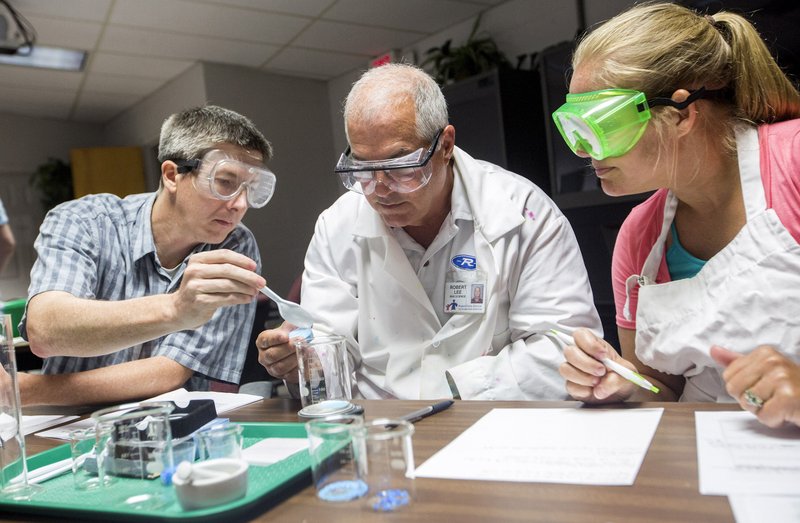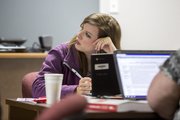FARMINGTON -- Asking students to give an argument for why something happens can make them uncomfortable because they worry about being right, a science specialist told a group of teachers Thursday.
Using arguments to drive discussion in science labs pushes students to make sense of, process and understand what they are learning, said Kory Roberts, who teaches biology and physical science at Rogers High School.
At a Glance
Next Generation Science Standards emphasize eight science and engineering practices:
- Asking questions and defining problems
- Developing and using models
- Planning and carrying out investigations
- Constructing explanations and designing solutions
- Analyzing and interpreting data
- Engaging in argument from evidence
- Using math and computational thinking
- Obtaining, evaluating and communicating information
Source: Next Generation Science Standards, www.nextgenscience.…
Roberts was among 14 high school science teachers from Benton and Washington counties who attended a workshop Thursday on "Argument Driving Inquiry in Chemistry: Lab Investigations in Grades 9-12," featuring labs from a book of the same title by the National Science Teachers Association. The workshop was offered in Farmington by the Northwest Arkansas Education Service Cooperative.
Science teachers like Roberts are preparing for changes in science instruction with the implementation of Next Generation Science Standards in Arkansas.
"These skills are things students can take with them through the rest of their lives and be lifelong learners," Roberts said. "Information is so readily available. You need to be able to evaluate that information, the source and the quality of the information."
The State Board of Education in 2014 endorsed the nationally developed Next Generation Science Standards and authorized the Arkansas Department of Education to develop them into standards that fit the state's curriculum mandates, according to the department. The new science standards set expectations for what students should know and be able to achieve.
The standards will be implemented for kindergarten through fourth grade in 2016-17, for fifth through eighth grade in 2017-18 and for ninth through 12th grade in 2018-19.
On Thursday, Roberts teamed with Gentry High School science teacher Becky Caswell and fellow Rogers High School chemistry teacher Robert Lee for a simple science lab on solutions, which they could adapt for use in their classrooms.
Except instead of following step-by-step instructions for the lab, they had to design a method for experimenting, collect data, analyze the data and then come up with an initial argument, based on the argument-driving inquiry model of teaching. The book published in October 2014, said Lara Irvin, who led the workshop with Virginia Rhame, a science specialist for the cooperative office.
The model pushes students away from memorizing facts and encourages them to apply skills to different situations, said Irvin, a chemistry teacher at Har-Ber High School in Springdale.
"It's encouraging kids to use scientific thinking, instead of accepting what scientists say," Irvin said.
Roberts' group designed a series of experiments to help it explain why the surface area copper II sulfate crystals, the temperature of water and the amount of stirring affect how fast the crystals dissolved in the water.
They used room temperature water, chilled water and heated water, along with copper II sulfate in the form of a fine powder, medium crystals and large crystals and a device that can stir consistently at different speeds. They recorded times and temperatures involved.
Making an argument required them to make a claim -- small particles in a warmer environment that are rapidly stirred will dissolve at the fastest rate -- supported by evidence gathered during the experiments. They supported their claim using knowledge of a theory that a solution is formed through interactions of a solvent and solute particles.
Anything that increases the probability of those interactions will increase the rate of solution, Lee said.
Argument is an important part of science because some scientific ideas turn out to be wrong, Roberts said.
"Your positions are put up for critical consideration by your peers and others," he said. "Science is an open process of thinking."
Designing labs to teach students about that process is challenging because of the amount of content teachers are expected to cover in science and because students aren't used to being asked to establish a question they want to answer or a hypothesis they want to test, Roberts said.
Caswell likes to plan lessons with hands-on activities and to push her ninth-graders to think and answer their own questions, she said. Her students, however, are used to lab assignments where they are given step-by-step instructions, rather than having the freedom to design an experiment.
The model introduced at the workshop involves teachers giving students information and seeing what they can do with it, Caswell said. Students make arguments, test their claims and are subject to criticism from classmates.
"It's all about the kids doing the work," she said.
NW News on 07/10/2015


